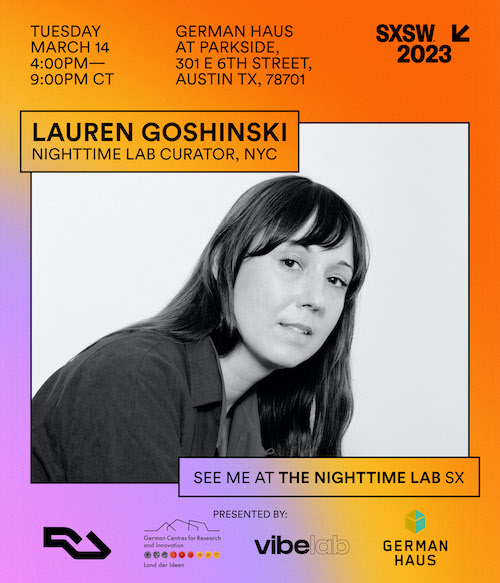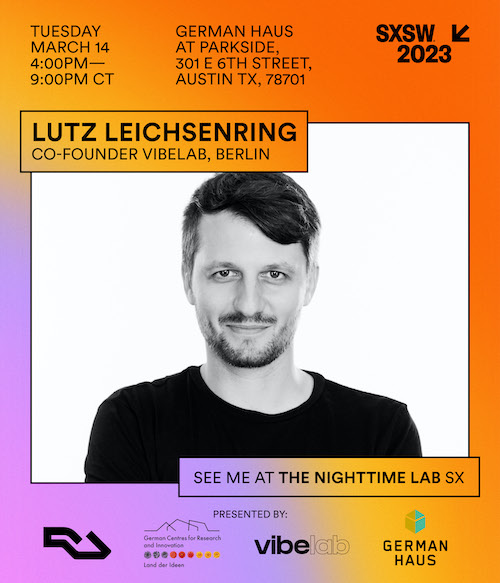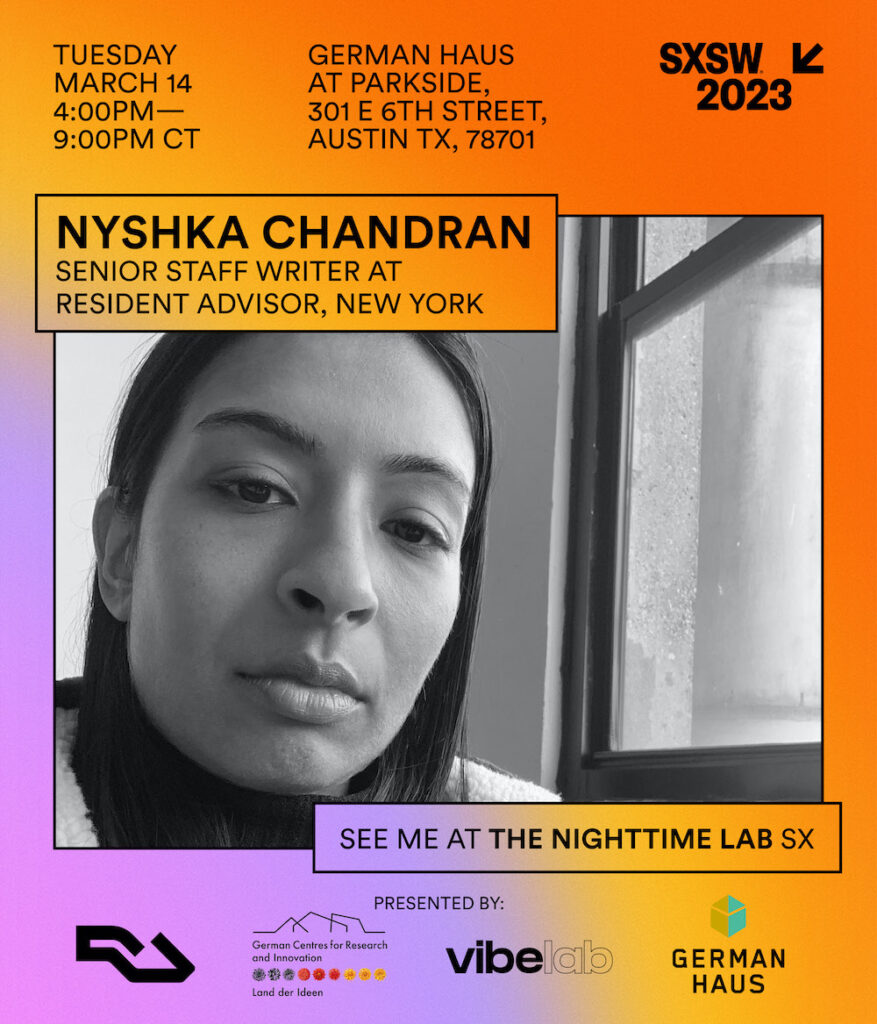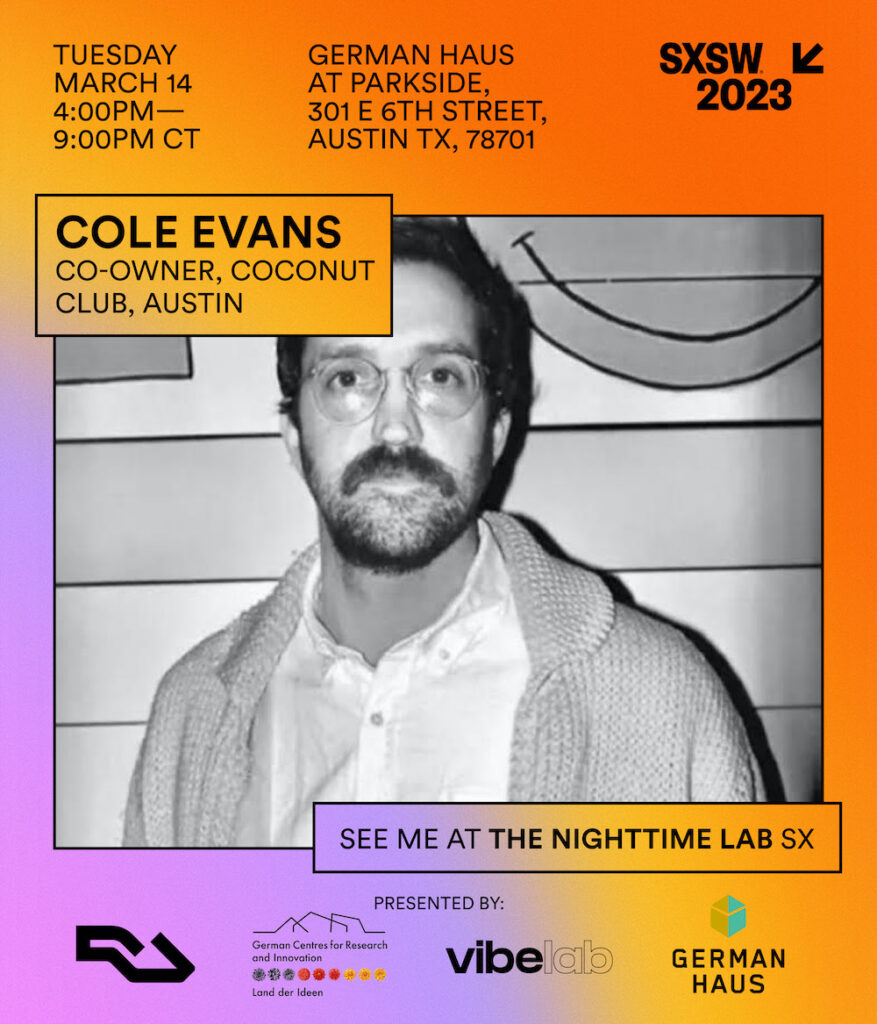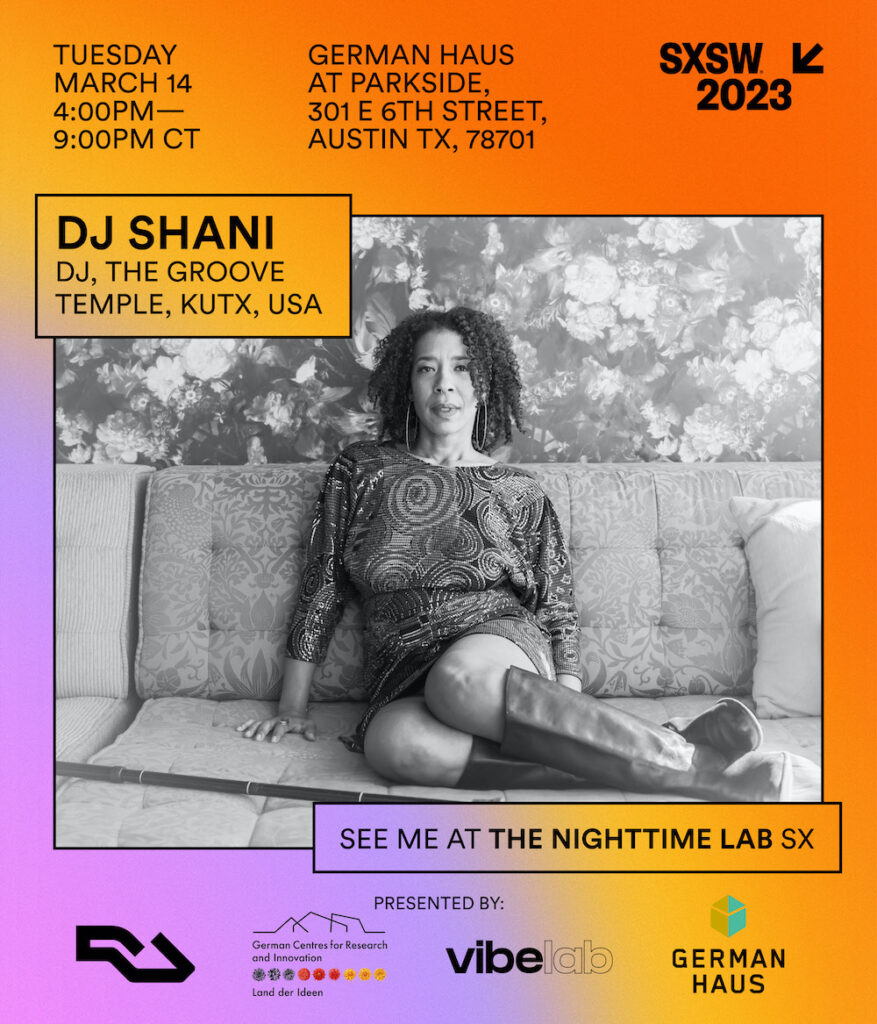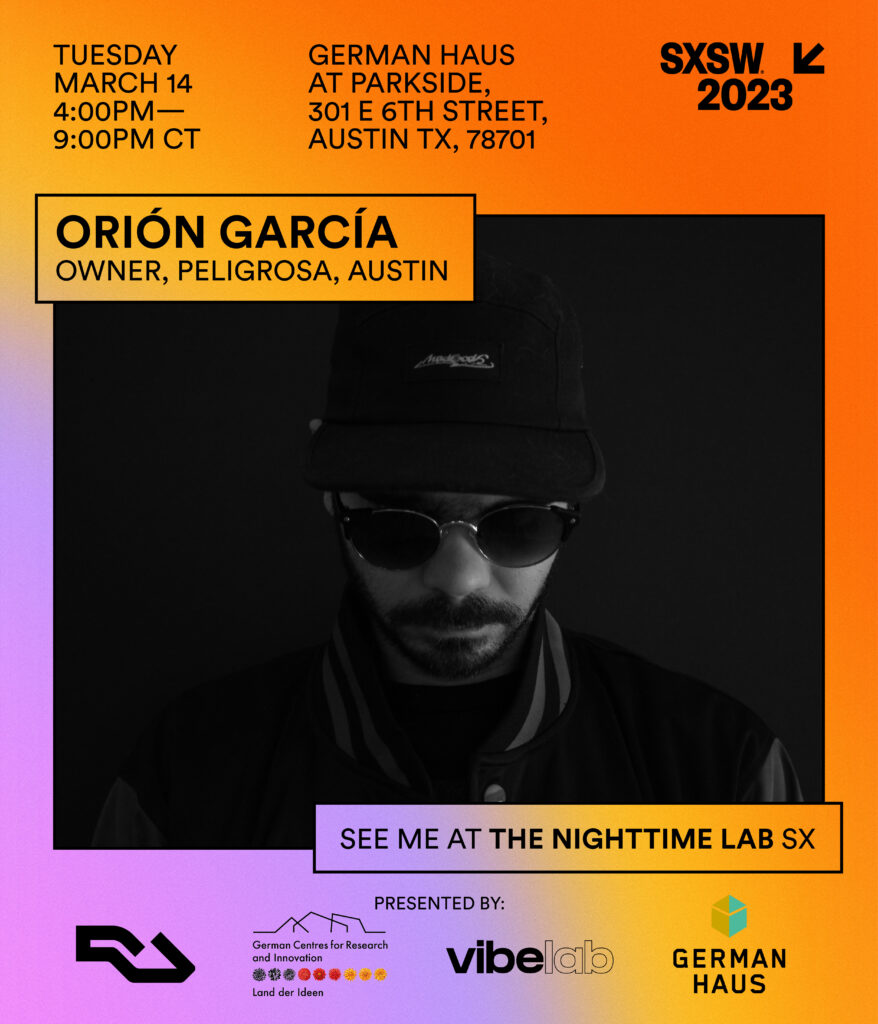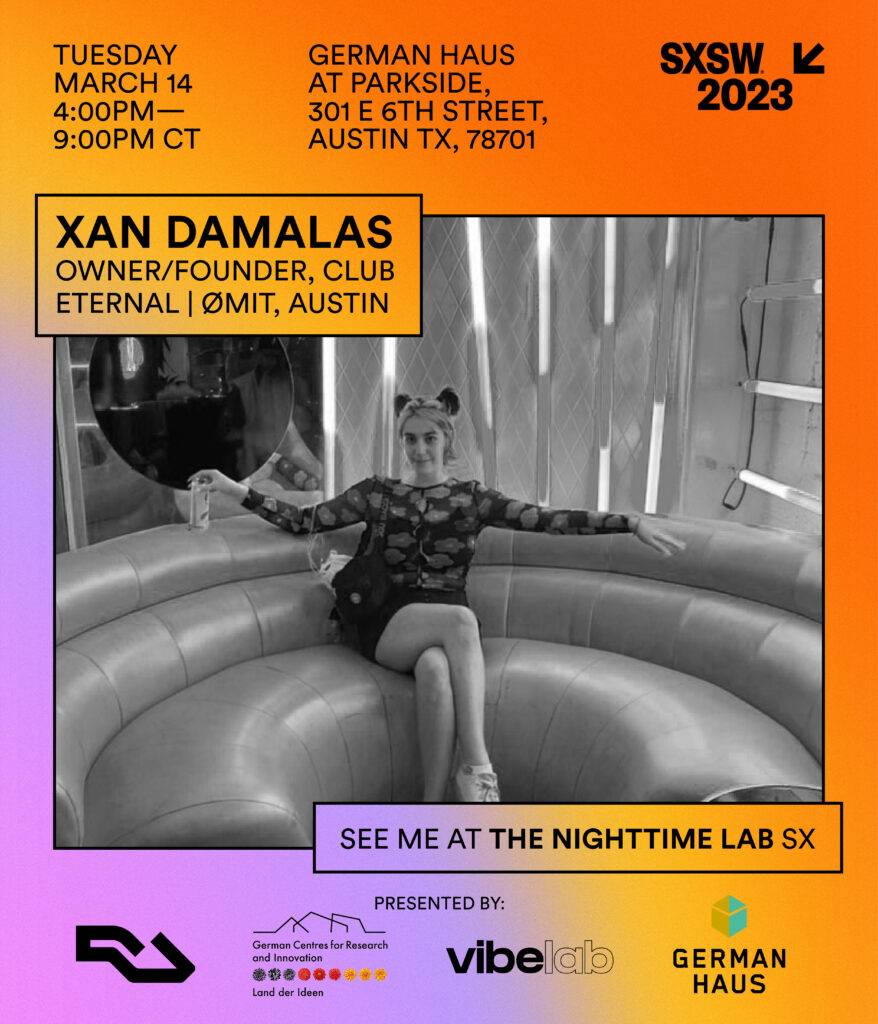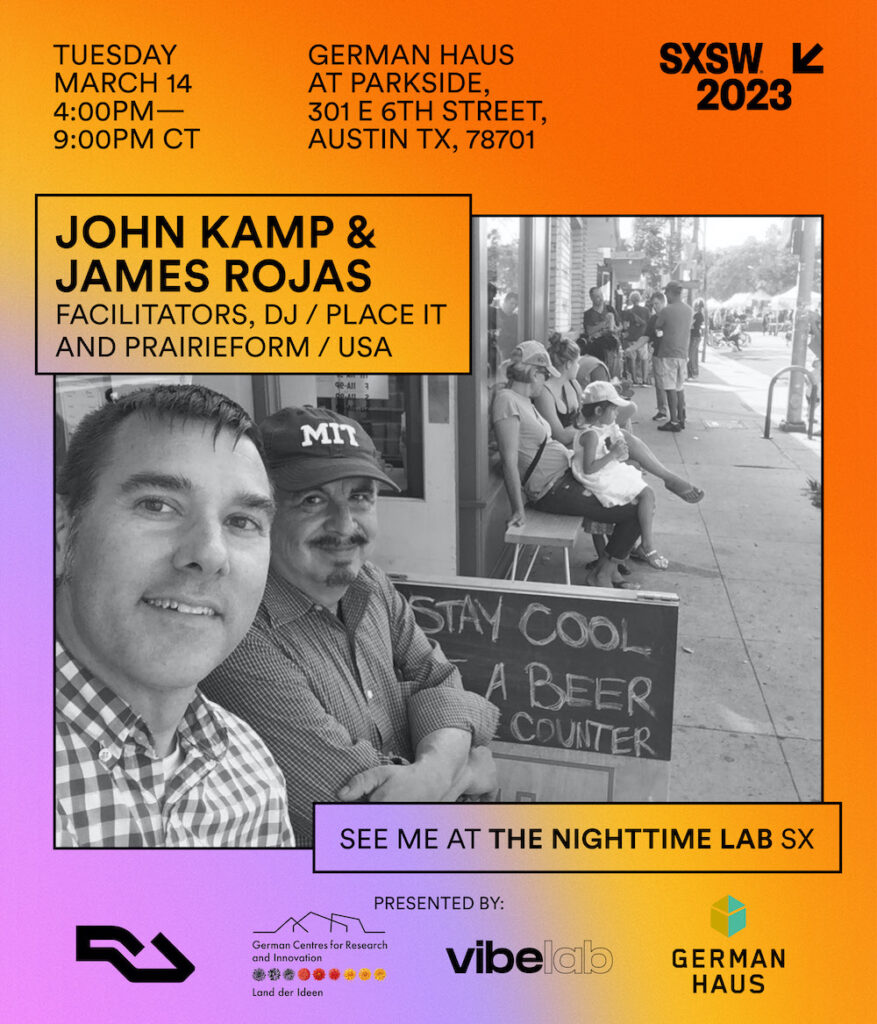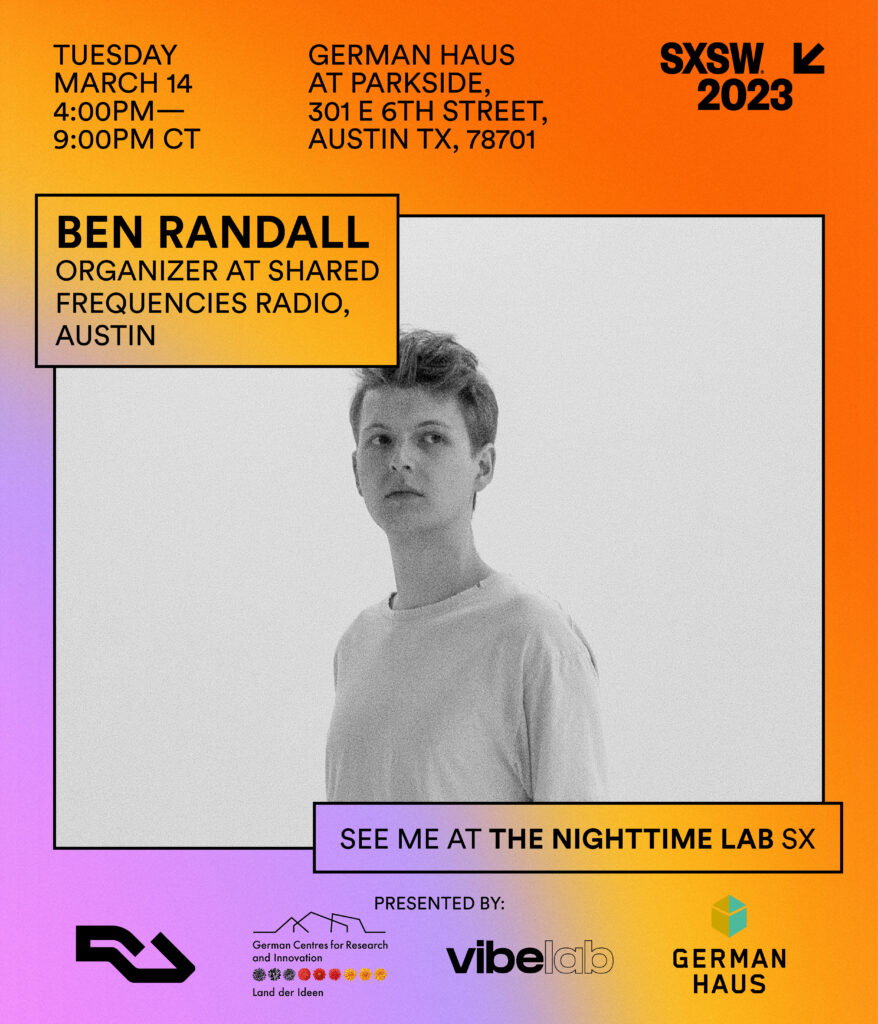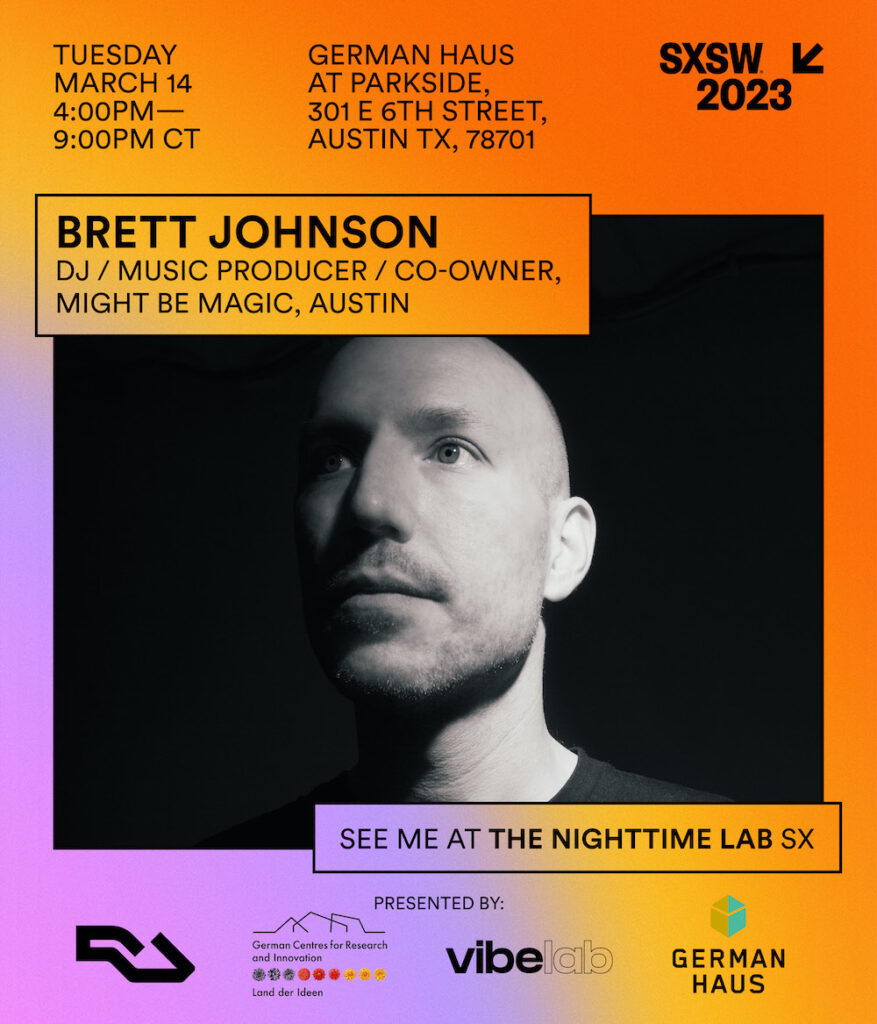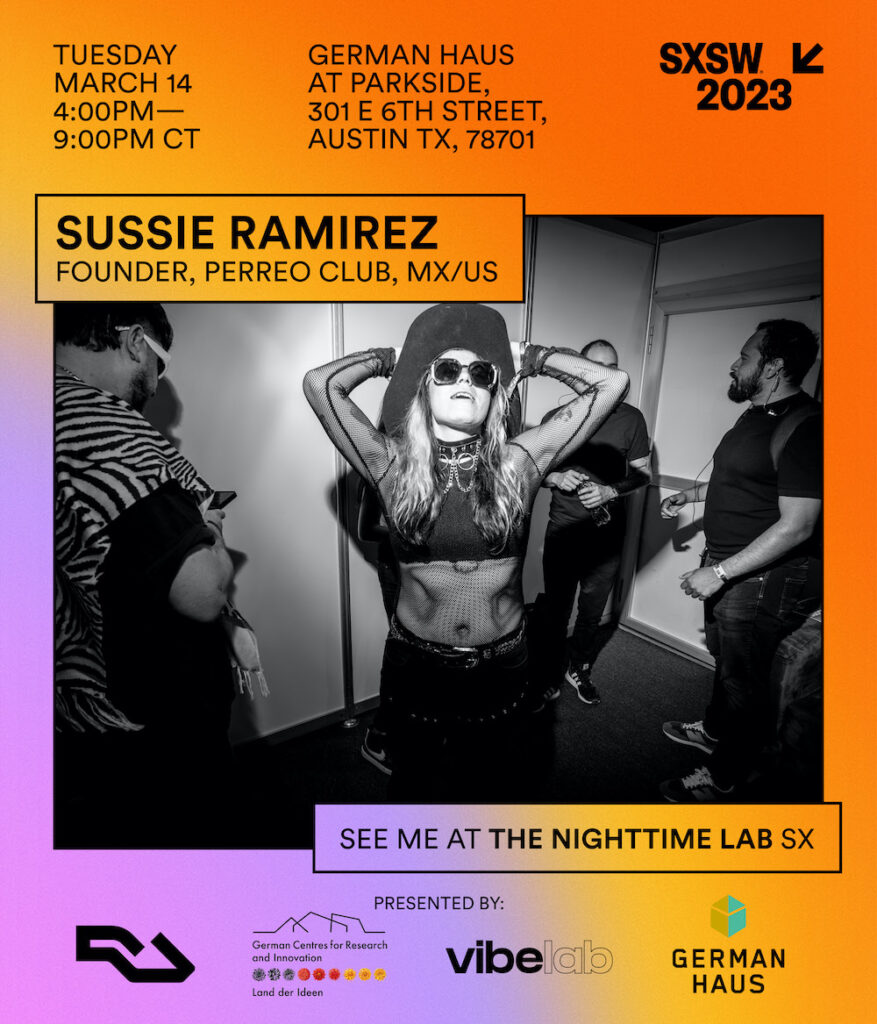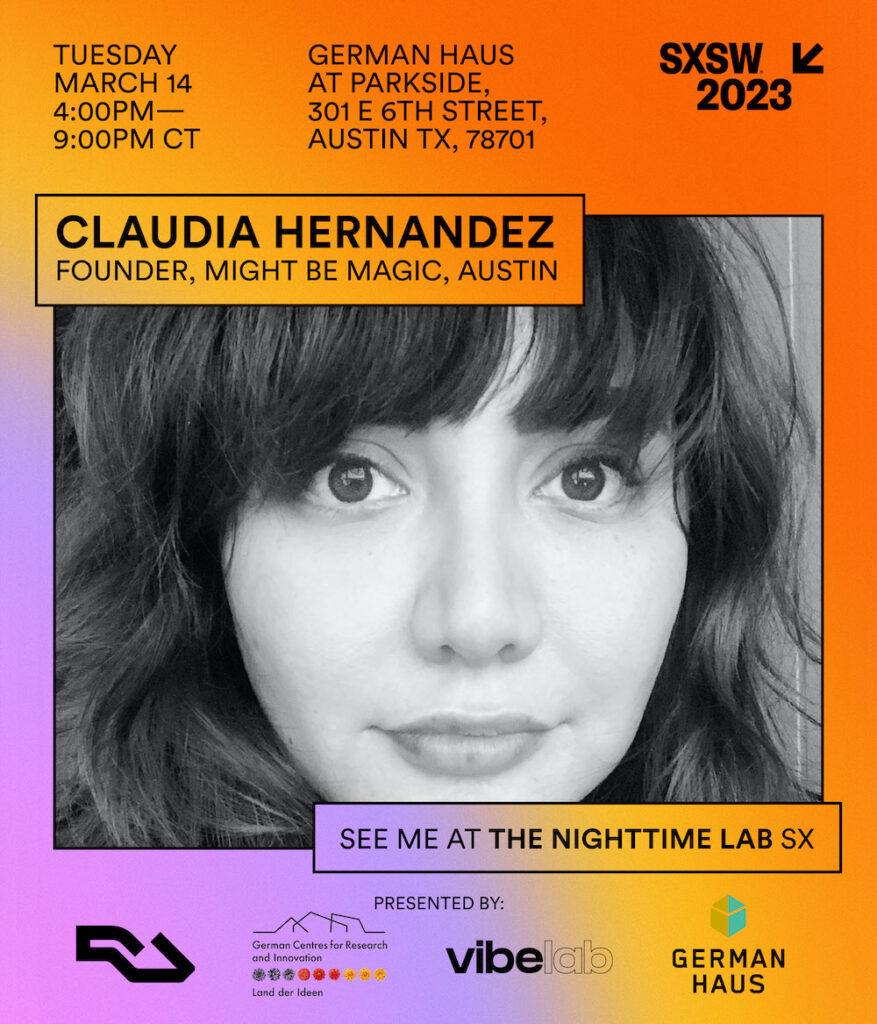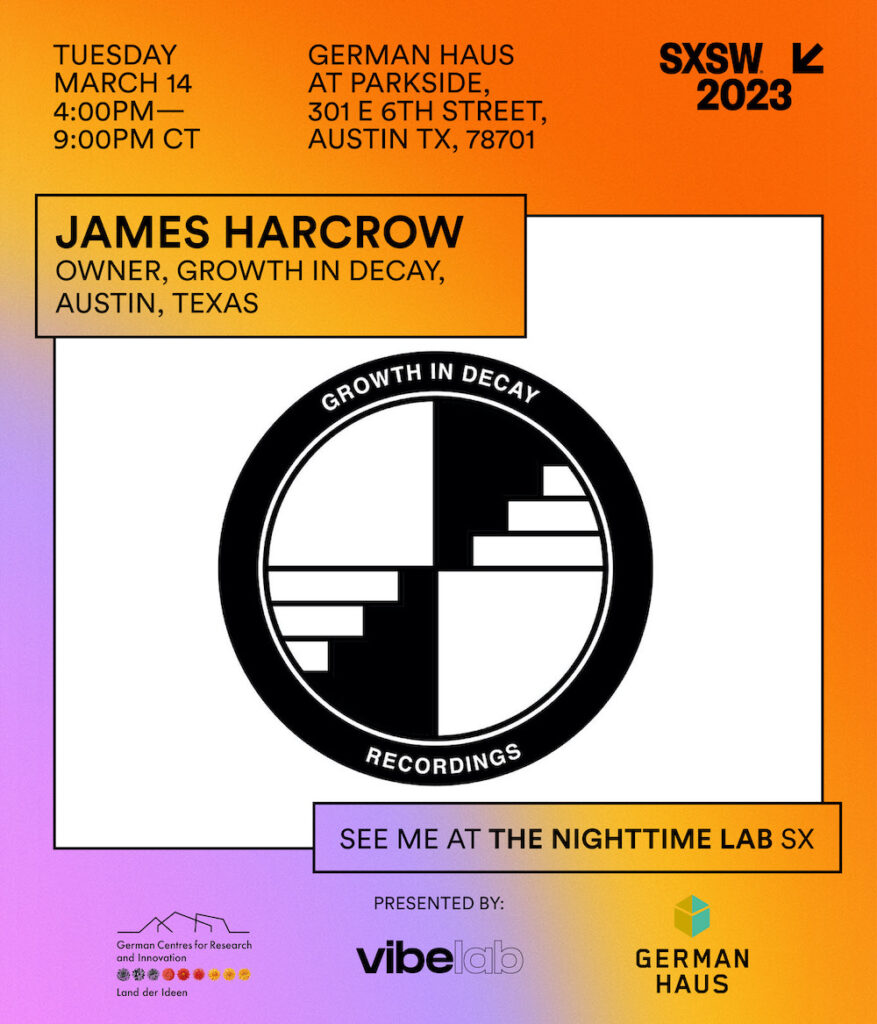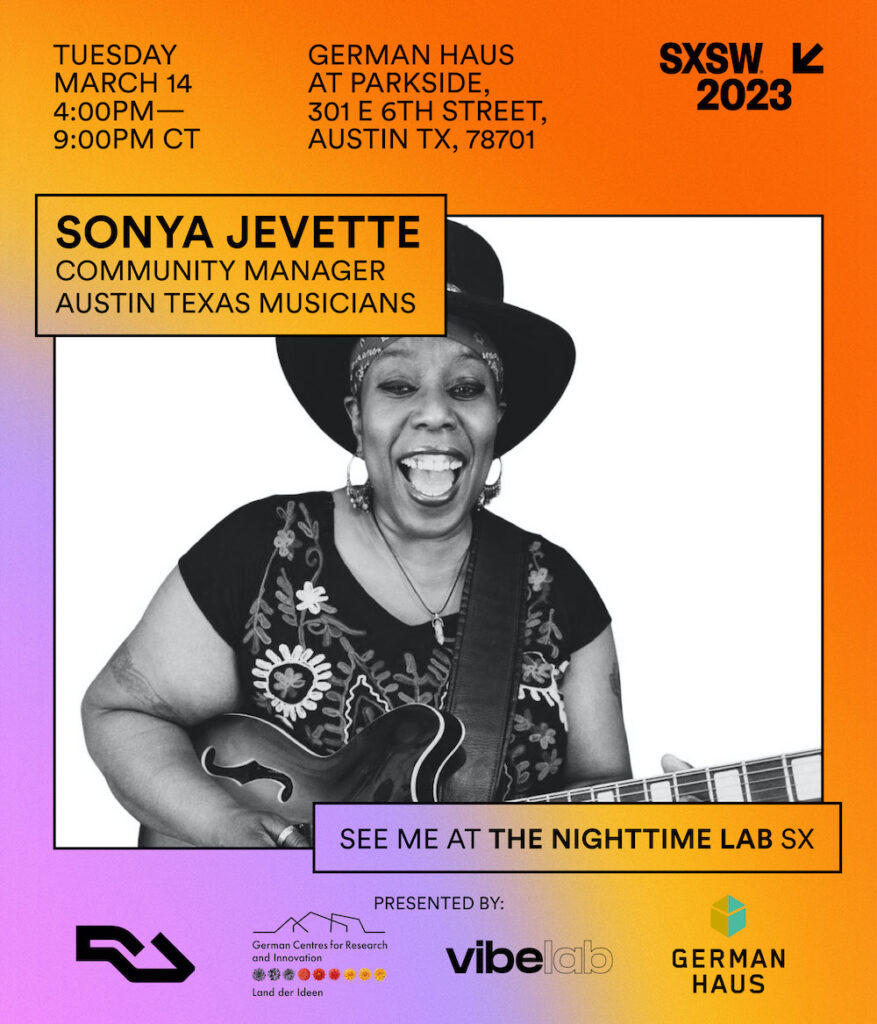Search Results for:
VibeLab’s Nighttime Lab at SXSW spotlit Austin’s independent scene.
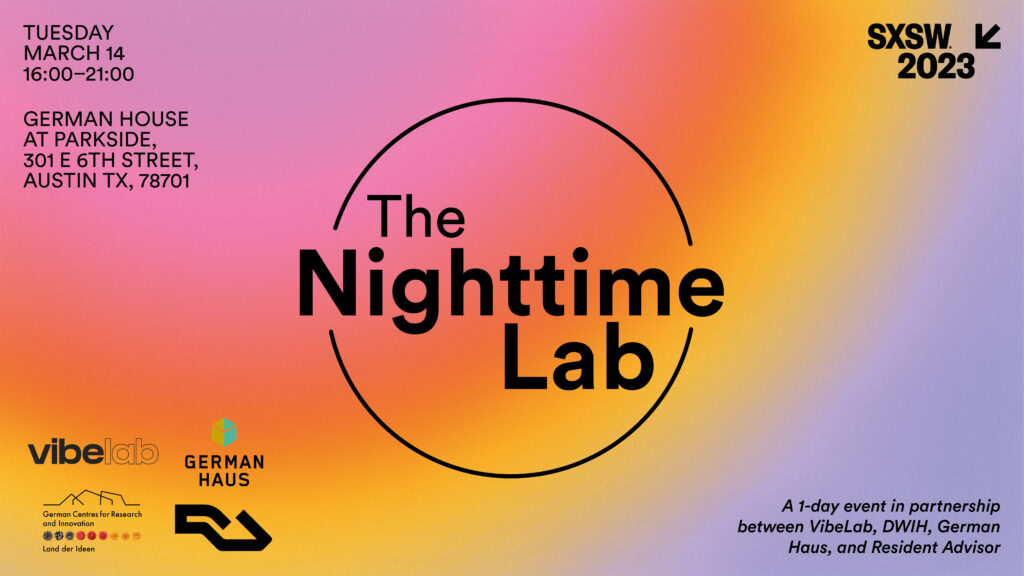
Event Review:
Last month’s Nighttime Lab program at the South by Southwest (SXSW) festival in Austin was a resounding success, showcasing the efforts of cultural producers to preserve independent culture in the face of rapid real-estate development and expanding displacement in the city.
From online radio stations to regionally focused record labels, clubs, intimate warehouses, and renegade-style events, these spaces and parties provide essential community connections and platforms for the expression of the diverse cultures that call Austin home. These spaces and communities innovate Austin as much as the tech startup down the street and provide the essential social infrastructure that often centres marginalized communities.
The program was made possible by the collaborative efforts of the German Center for Research and Innovation (DWIH) New York, German Haus, and Resident Advisor who partnered with us at VibeLab to bring the Nighttime Lab to life.
The City of Austin, developers, residents, and platforms like SXSW benefit greatly from the presence of these spaces and groups to “keep Austin weird,” a slogan that has become synonymous with the city’s unique culture. However, the increasing pace of development threatens to make this statement a thing of the past, which is why Austin’s leadership must connect with grassroots groups to find ways to preserve these spaces and provide resources for their operations and community safety/accessibility. By doing so, Austin can continue to thrive as a diverse cultural destination, keeping the city attractive, unique, inclusive, and economically sustainable for all its residents and visitors.
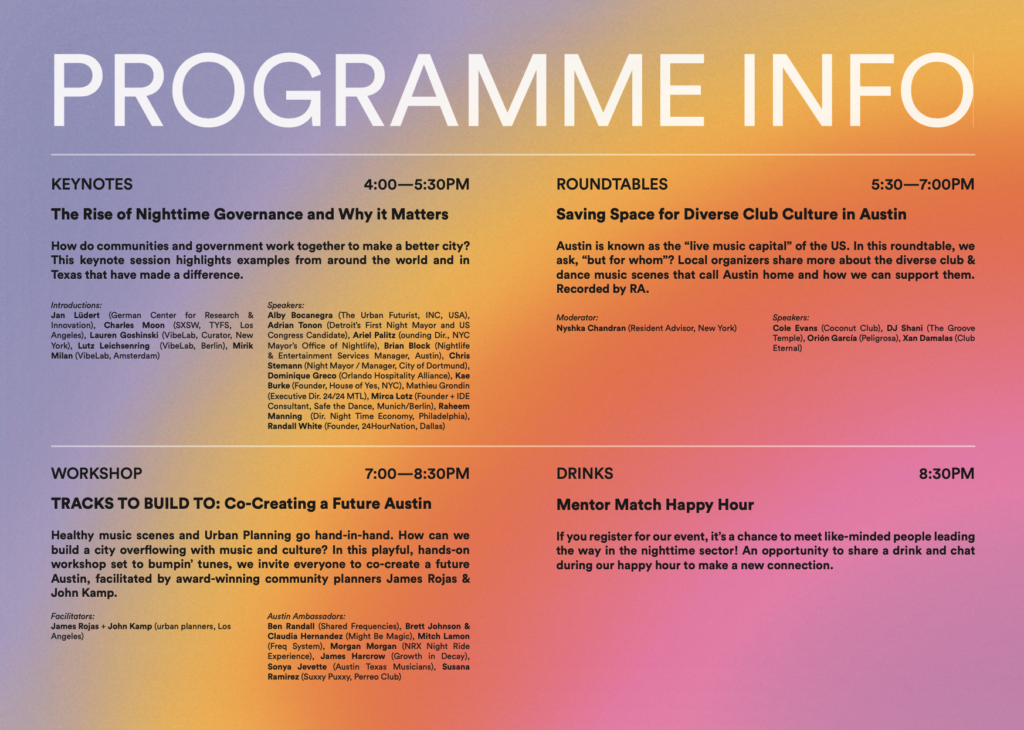
KEYNOTE
4:00 – 5:00 pm
The continuous rise of Nighttime Governance, and why it matters
How do communities & government work together to make a better city? This session platforms a series of keynote presentations highlighting examples of Nighttime Advocacy from around the world and in Texas that have made a difference.

We kicked off with introductions from the curator Lauren Goshinski, SXSW Music Programmer Charles Moon and VibeLab’s Co-Founders Lutz and Mirik
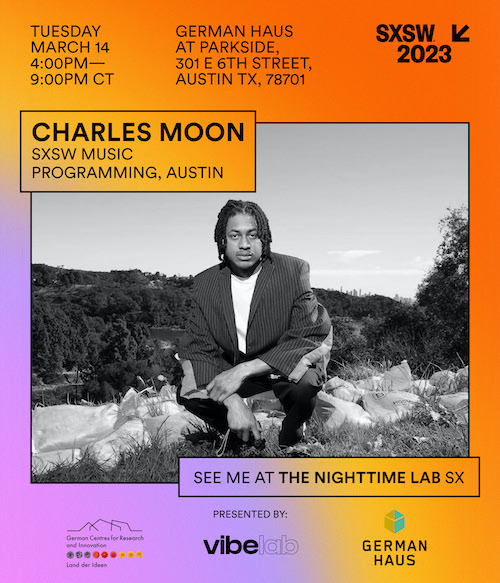
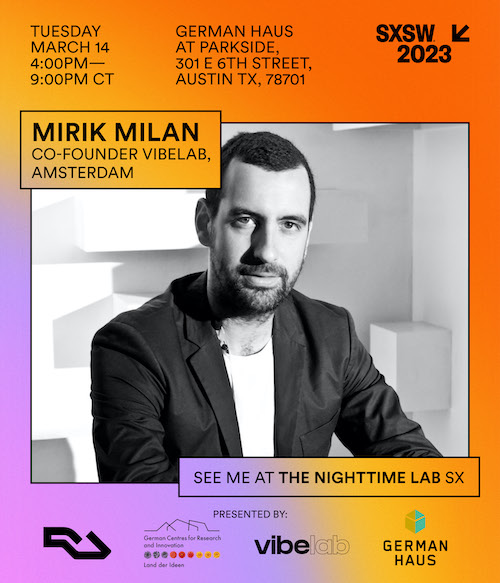
Followed by presentations from:
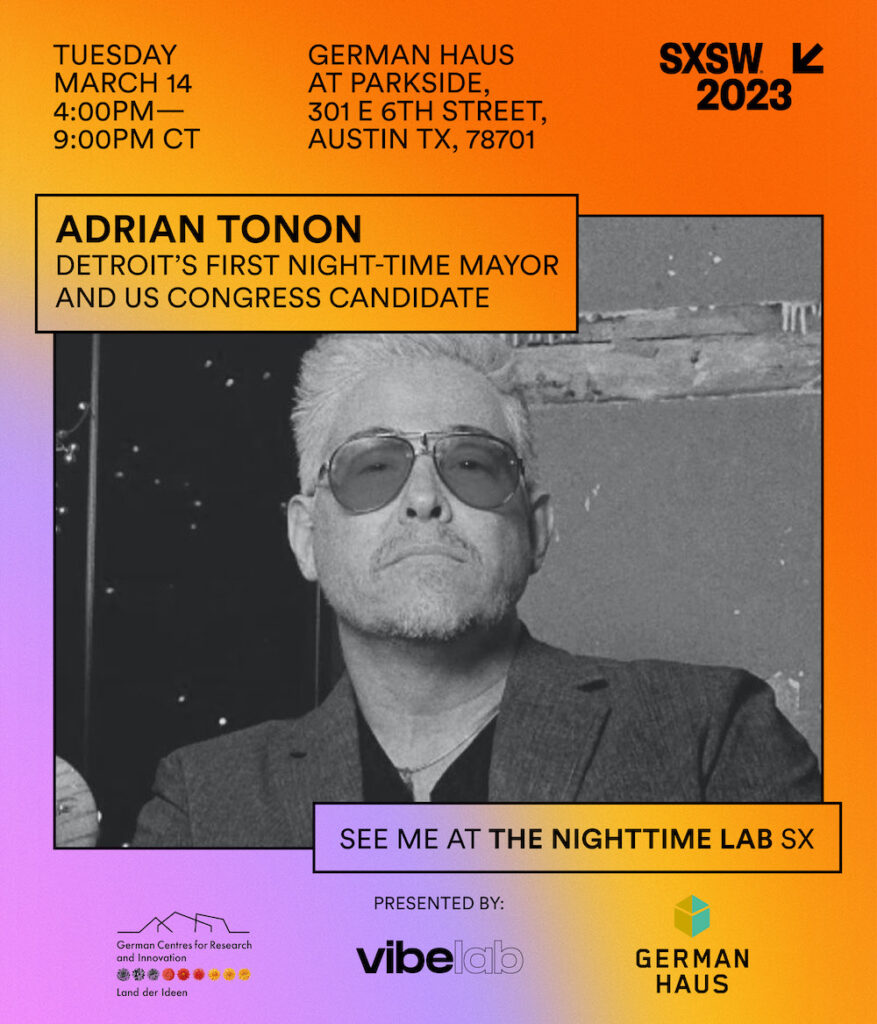
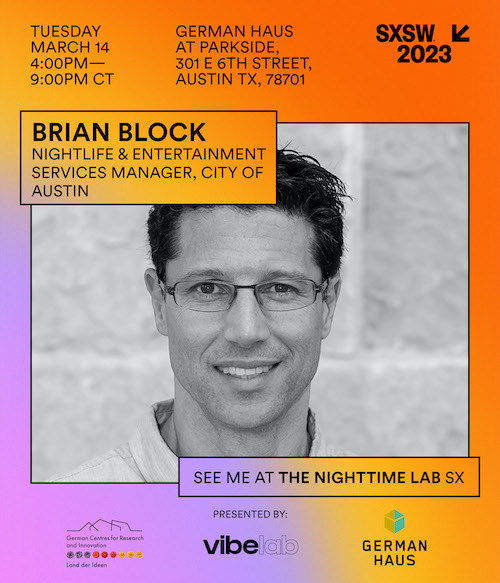
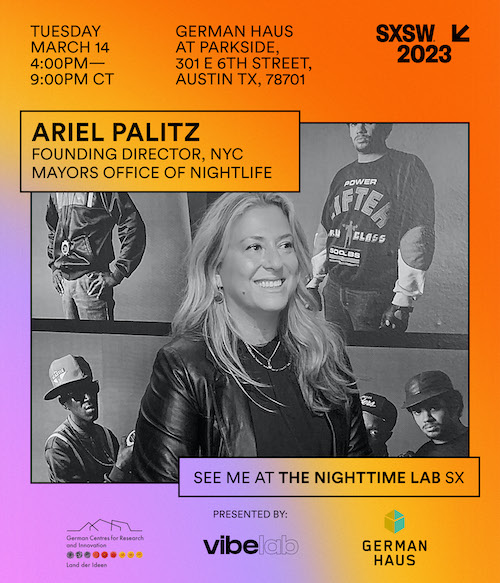
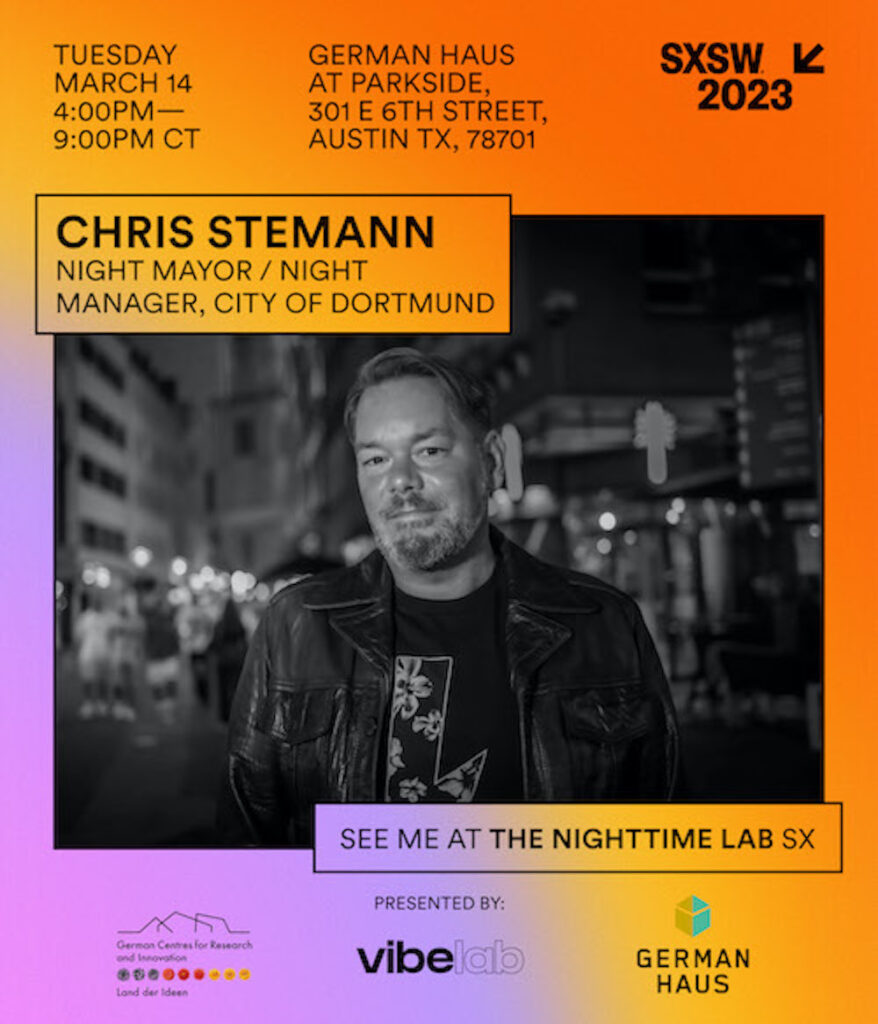
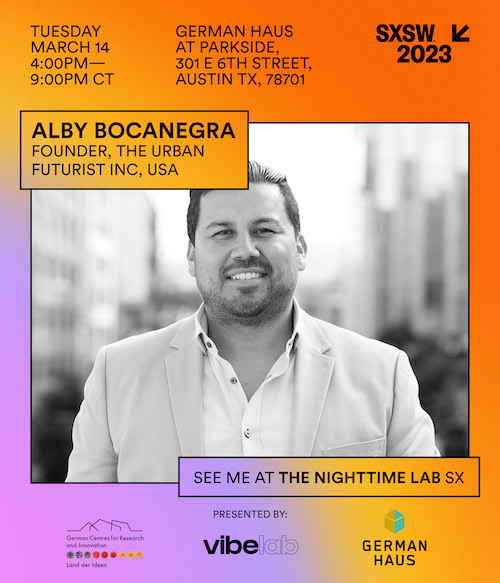
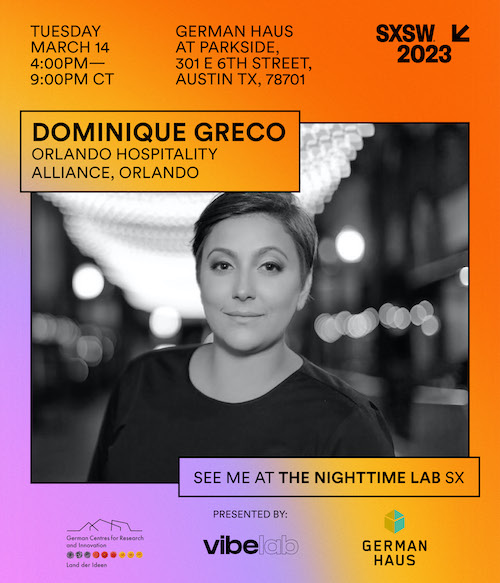
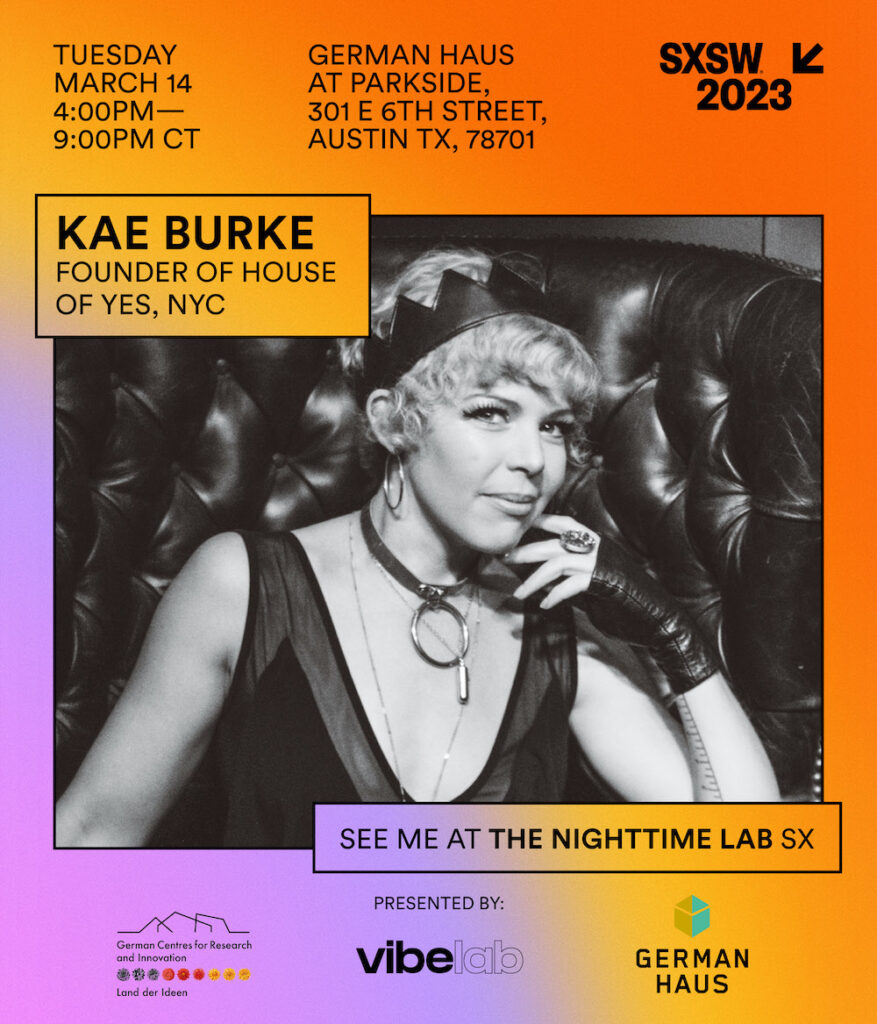
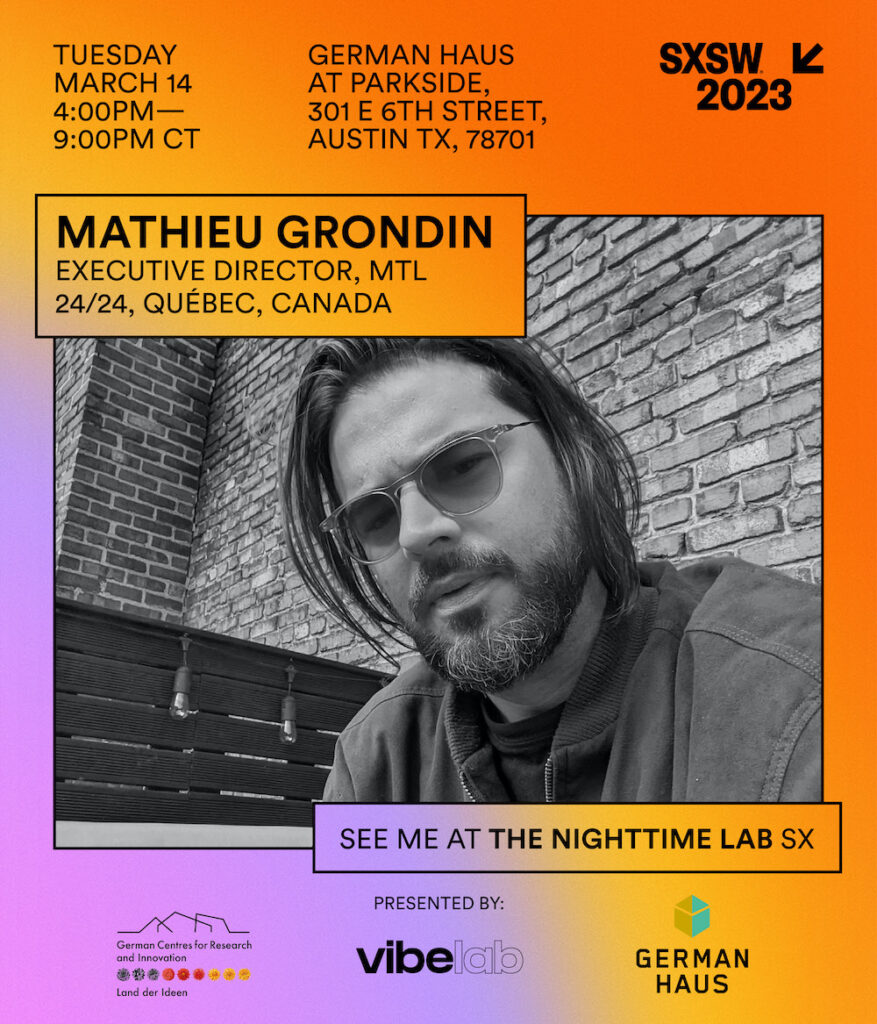
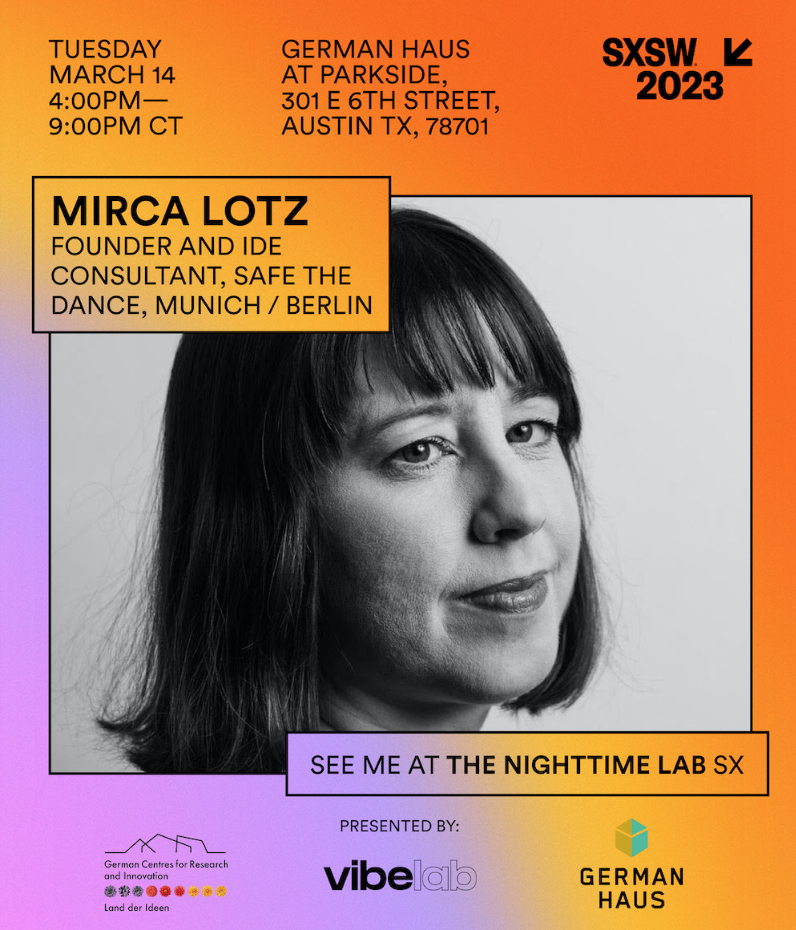
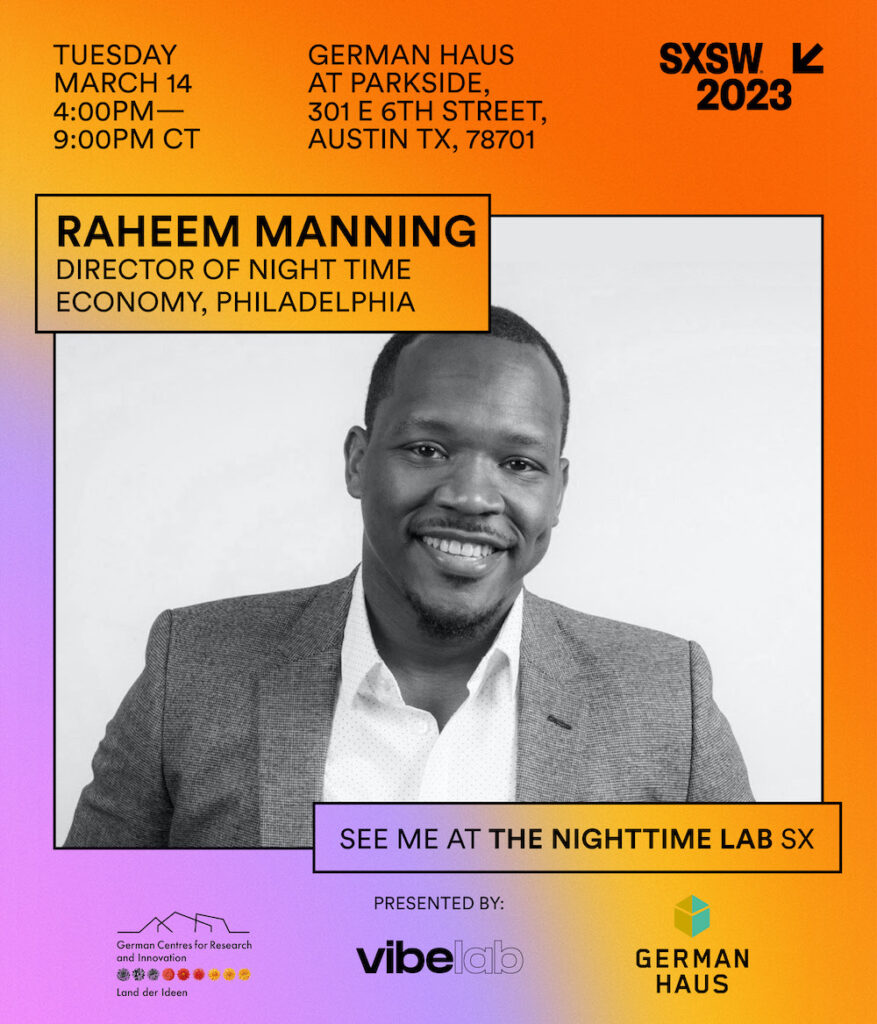
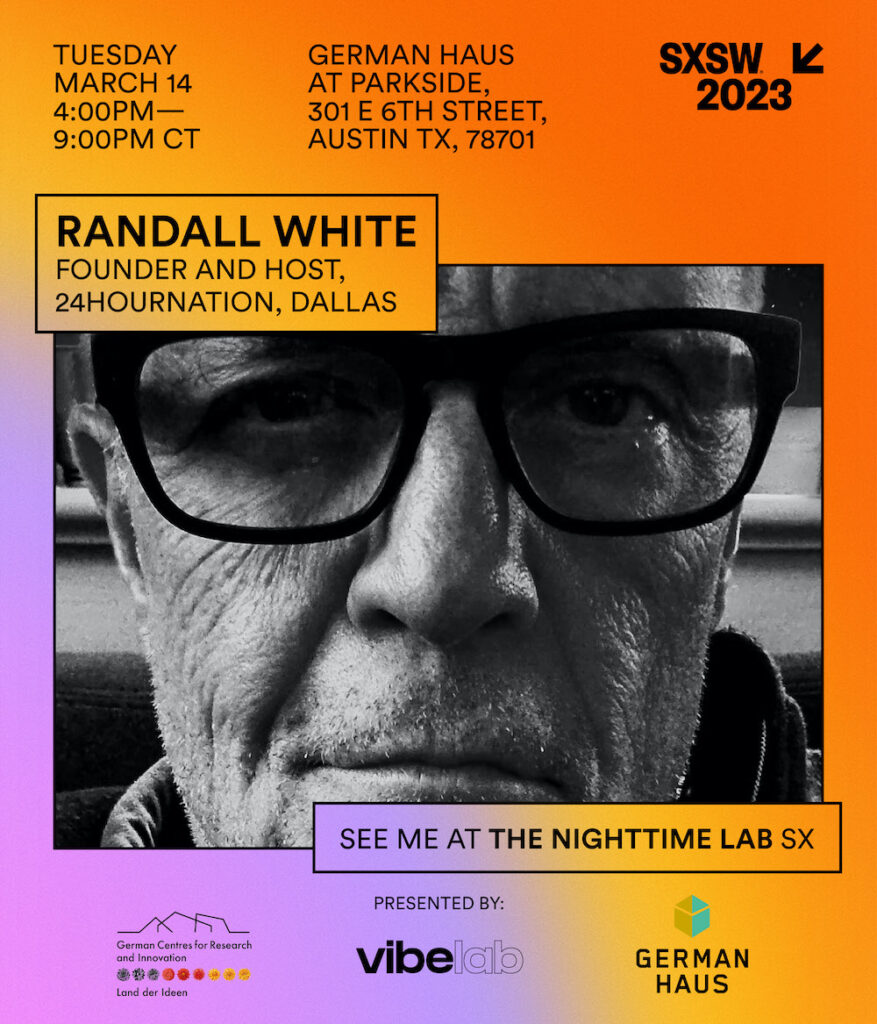

Roundtables
5:30-7.00 pm
Saving Space for Diverse Club Culture in Austin
Roundtables
5:30-7.00 pm
Saving Space for Diverse Club Culture in Austin

Healthy music scenes and Urban Planning go hand-in-hand. How can we build a city overflowing with music and culture?
In this playful, hands-on workshop set to bumpin’ tunes, we invited everyone to co-create a future Austin, facilitated by award-winning community planners James Rojas & John Kamp.
including Mitch Lamon (Freq System), Morgan Morgan (NRX Nightride Experience)
Drinks
8.30 pm- 9 pm
Mentor Match Happy Hour
This was a unique opportunity to share a drink and chat during our happy hour to make a new connection, with music from DJ Shani.
How do I get involved?
Interested in attending or speaking at future Nighttime Lab events? Email jess@vibe-lab.org
How do music genres shape inequalities and spacial dynamics in nightclubs?
Two recent papers by Timo Koren expand on established nighttime research topics of identity formation and regulation, viewing nightlife through the lens of cultural production.
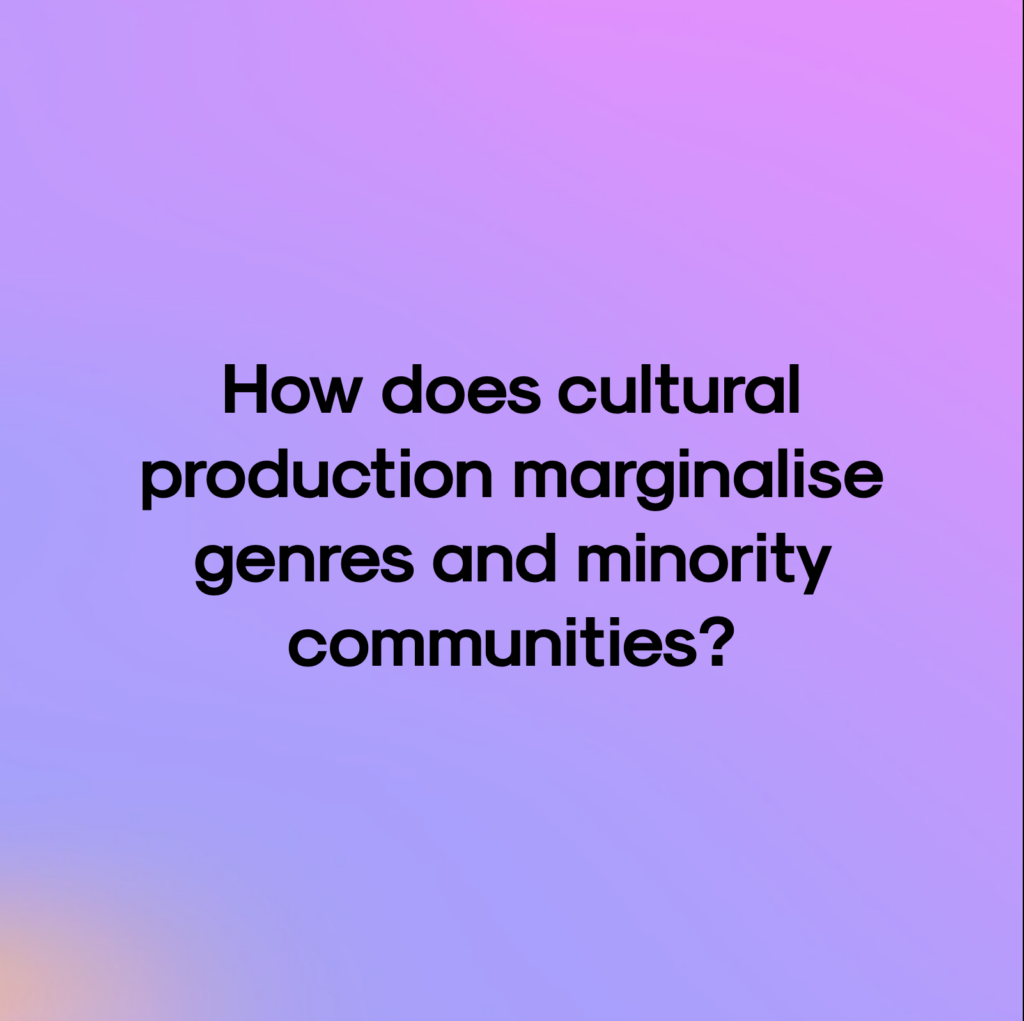
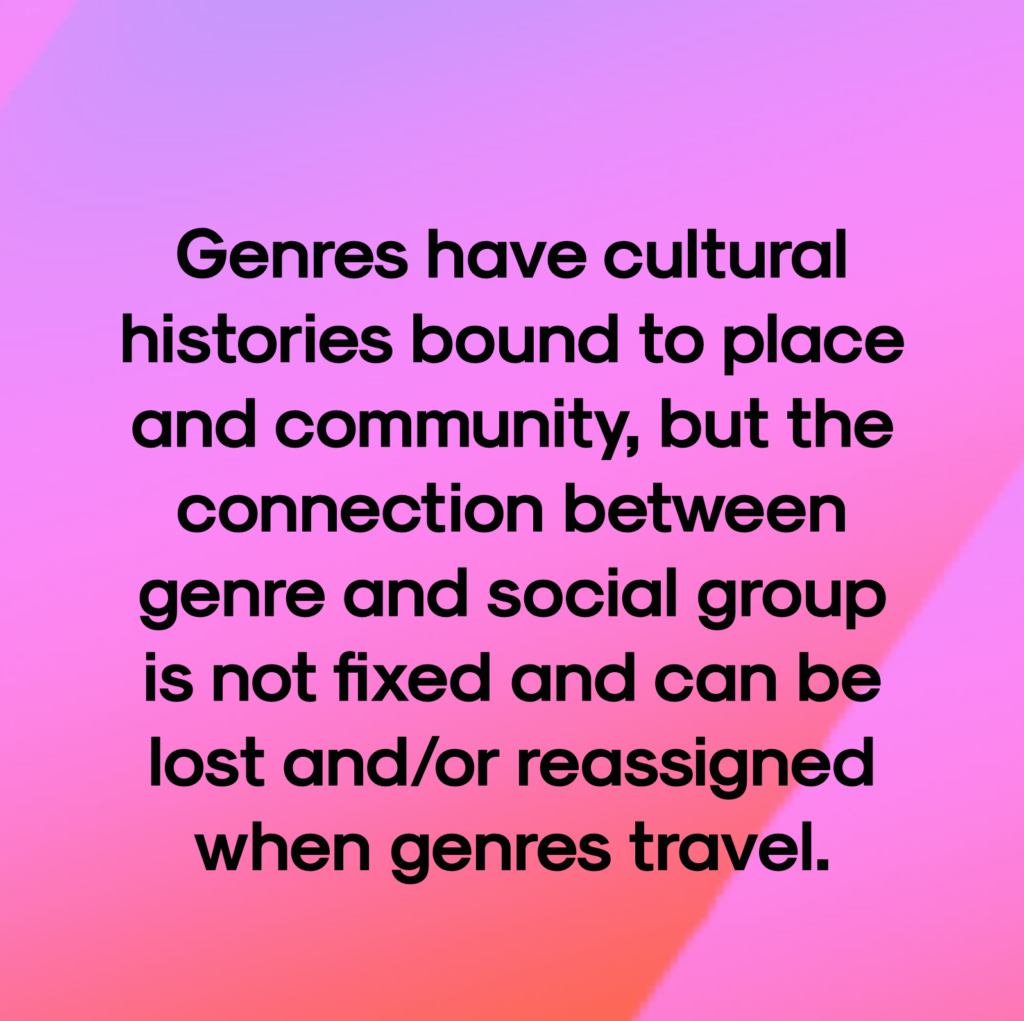
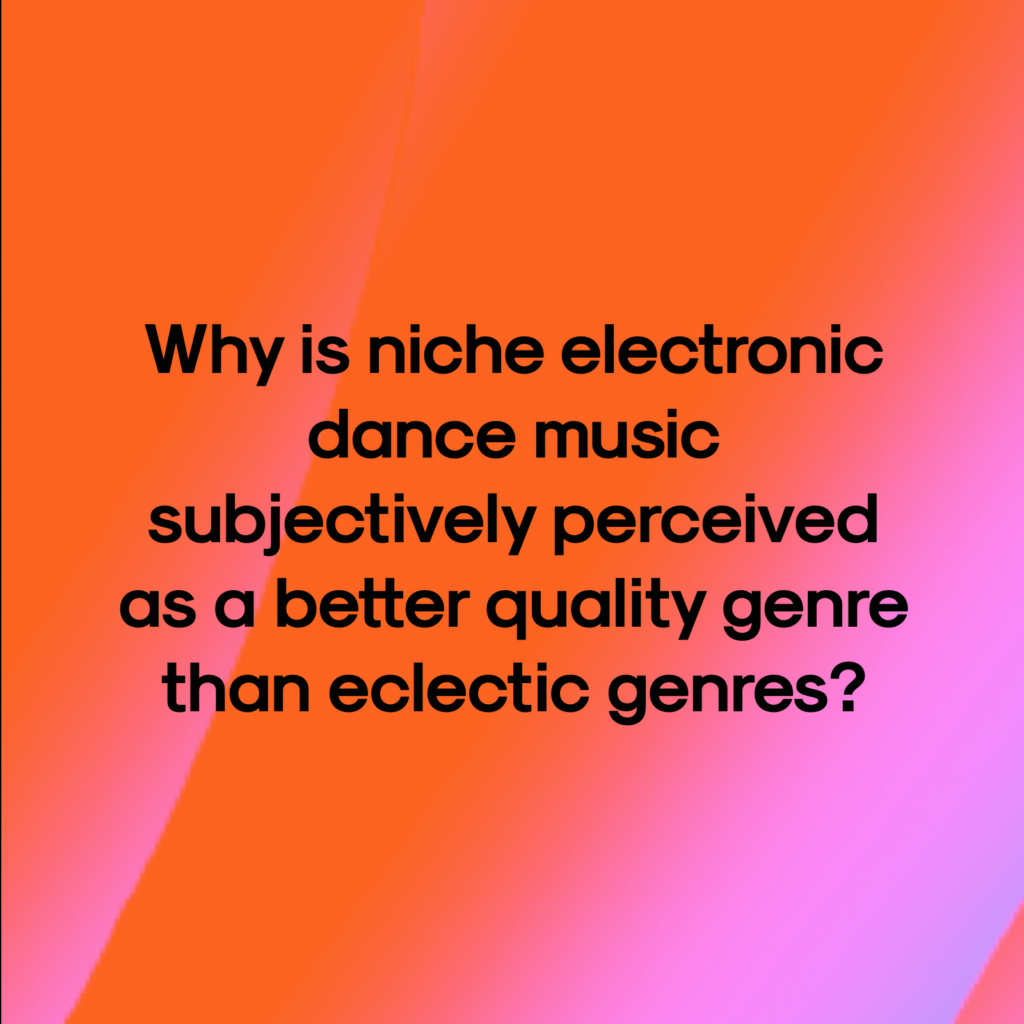
- The research examines how the cultural production and economic organisation of club nights at genre-specific venues impact genres’ gendered meanings and racial inscriptions.
- Gender inequalities in nightlife employment result from informal work cultures’ privileging of male labour, including closed social networks and sexist perceptions and stereotypes within the production of the genre.
- Niche electronic dance music is subjectively perceived as a better quality genre than eclectic genres due to DJ prestige and other factors.
- Niche EDM is associated with masculinity; some eclectic genres, like pop music, are seen as feminine. Genres have cultural histories bound to place and community, but the connection between genre and social group is not fixed and can be lost and/or reassigned when genres travel.
- This research uncovers the importance of programming and promotion in shaping social and spatial conditions in nightlife spaces and nighttime economies.
The Publications:
Koren, T. (2023) ‘ “They were told it was too Black”: The (re)production of whiteness in Amsterdam-based nightclubs’, Geoforum, [link]
Koren, T. (2022) ‘The work that genre does: How music genre mediates gender inequalities in the informal work cultures of Amsterdam’s nightclubs’, Poetics, [link]
How do music genres shape inequalities and spacial dynamics in nightclubs?

Two recent papers by Timo Koren, PhD and researcher and lecturer at Erasmus University, contribute valuable insights to nighttime research on how music genres shape social and spatial dynamics and inequalities of nightclubs. This research expands on established nighttime research topics of identity formation and regulation, viewing nightlife through the lens of cultural production. Using case studies of niche EDM and eclectic clubs in Amsterdam in 2019, it examines the ways in which the cultural production and economic organisation of club nights at genre-specific venues impact the gendered meanings and racial inscriptions of genres.
Here, the cultural production of the genre is the process of programming and organising club nights in niche EDM (styles outside mainstream EDM) and eclectic (mix of genres including r&b, pop, hip hop and dancehall) venues. Cultural production produces social and cultural meaning, and economic conditions can lead to inequalities in labour and public participation. Genre is understood not only as a descriptive label, but also as a set of orientations, expectations, and conventions coming together to produce a certain kind of music. Within genres, norms, standards and geographies are not fixed and can change based on social, cultural and economic interactions.
What causes gender inequalities in the cultural sector? Does this differ along genre lines? How is meaning assigned to gender in different genres? Existing research shows that gender inequalities in nightlife employment are a consequence of informal work cultures’ privileging of male labor, including closed social networks and sexist perceptions and stereotypes within the production of the genre.
This study uncovers new and localised debates. Genre cultures are influenced by public critique and political discourses on gender equality and exclusion, manifesting here in observed discussions on gender parity in line-ups and employment in niche EDM spaces. Efforts for gender parity and diversity are encouraged by these influences and celebrated in some nightlife spaces. Despite progress, club owners, promoters, DJs and other positions of influence remain majority male-occupied. Data reveals the prevalence of social and cultural constructions of genre ‘quality’, innate gendered music taste and genre ‘safety’.
Niche EDM is subjectively perceived as a better quality genre than eclectic genres, due to DJ prestige and other factors. Niche EDM is associated with masculinity and some eclectic genres, like pop music, are seen as feminine. Some venues curate ‘female-friendly’ club nights on the assumption that masculine genre nights will lead to violence. This ignores real safety needs such as awareness and anti-harassment training. Sometimes genre, gender and place are connected – for example, ‘masculine’ Berlin techno. When genres travel, gendered standards and assumptions follow. This culminates in static, limited and less critical understandings of femininity and masculinity within genre communities.
How are genre identities and racial identities connected? How does cultural production marginalise genres and minority communities? How do genres become associated with race and how does that racialisation change over time and space? Existing research shows that processes of exclusion based on race, ethnicity and class originate partly from door policies and other access barriers. However, there are more stories to tell. This research looks at the ‘whitening’ process of historically POC genres and cultural narratives, the impacts of economic organisation in racialised genres and the experiences of POC promoters and nightlife patrons in majority white nightlife landscapes.
Genres have cultural histories bound to place and community, but the connection between genre and social group is not fixed and can be lost and/or reassigned when genres travel. House, techno, r&b and hip hop originate from POC communities in American cities. As these genres became popular in the Netherlands, they were absorbed into the majority of music cultures and ‘whitened’. Association with POC genre histories was lost when no connection was made with minority communities in the Netherlands. The ‘colourblind genre’ myth also detaches the genre from any racial association and does not acknowledge local contemporary POC genre scenes.
In Amsterdam, while efforts are made to recognise genre histories and integrate local communities, POC and other marginalised promoters face discriminatory barriers. Whiteness is still the ‘invisible norm’ in cultural production, and discriminatory standards can also be adopted from other majority-white scenes. The economic organisation of nightlife in Amsterdam necessitates that club nights are profitable, and many spaces subscribe to a uniform identity. Collectives and parties without permanent venue homes, often with mainly non-white and marginalised audiences, do not fit this model and are excluded from cultural production. Problematic attitudes tying POC audiences to unsafety and increased violence still exist.
This research uncovers the importance of programming and promotion in shaping social and spatial conditions in nightlife spaces and nighttime economies. It centres cultural production on combating discrimination and exclusion in nightlife. While dialogues and concrete steps are being taken, prohibitive stereotypes and other problematic standards remain. Promoters and programmers have the duty to address racial, gender and other barriers and bias in their spaces. This can be accomplished by 1) examining how nightclub production, economic organisation and other norms and standards contribute negatively and 2) engaging directly and inclusively with genre communities. After all, clubbers play a critical role by invoking genre social principles and ideals.
Read the publications from Timo Koren:
Koren, T. (2023) ‘ “They were told it was too Black”: The (re)production of whiteness in Amsterdam-based nightclubs’, Geoforum, [link]
Koren, T. (2022) ‘The work that genre does: How music genre mediates gender inequalities in the informal work cultures of Amsterdam’s nightclubs’, Poetics, [link]
Born to Mix: A Celebration of Unforeseen, Co-Creation, and Emerging Creativity
We at VibeLab curated the collectives and programmed the run of the show for this wild party for Absolut that took place in Cologne last weekend.
Bringing an unforgettable night of creativity, collaboration, and celebration of club culture. The event was brought together by local Cologne-based emerging collectives Schleuse Eins and E.P.I.Q alongside Absolut and took place at Helios 37, which was transformed into a dynamic canvas.
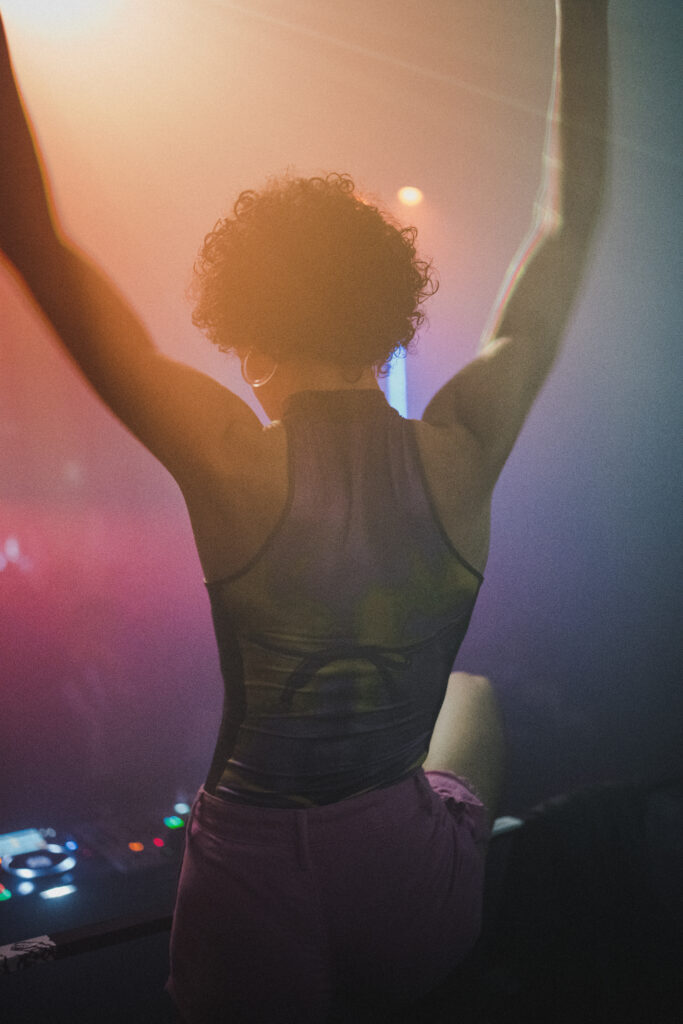
At Born To Mix, guests experienced way more than just drinking and dancing. The event showcased the groundbreaking interdisciplinary talent and local gems across one main floor and an ambient floor, celebrating the multi-dimensional facets of club culture. Guests were not only entertained by music but had the opportunity to experience various art forms, including visual arts, installations, and performances.
Born To Mix, is not just about entertainment. It also aims to encourage co-creation and raw creativity. The event provided a platform for artists and creatives to come together and exchange ideas, fostering an environment that promotes collaboration and experimentation.
Furthermore, Born To Mix, offered free entry for those who arrive early to meet others from the nighttime industries. This provided an excellent opportunity for networking and learning from fellow professionals and enthusiasts.
“Club culture is so much more than a dance floor. We’re happy to support local DJs, performers and collectives in expressing their interdisciplinary creativity within this project. Thanks to Absolut for giving this opportunity by providing resources and reach.”
VibeLab’s co-founder Lutz Leichsenring
Born To Mix is an ode to the unforeseen, co-creation, and encouraging raw creativity. It promises to be an unforgettable night celebrating club culture and multi-dimensional art forms.
More about the collectives:
Schleuse Eins
Schleuse Eins is a community-based off-location event series based in Cologne. Our focus is to create a high-quality nightclub experience in extraordinary places.
E.P.I.Q
E.P.I.Q. is a group of eight DJs based in Cologne whose mission is to combine their eclectic tastes for musical journeys through the night. They join forces with other artists, chefs, screen printers, etc for wholesome events with the local scene. From soul to hip-hop, R&B to world pop, house to breakbeats, bass to UK garage and more, they provide cute B2B2Bs, loving energy, and booty shaking all night long.
Line-Up
Huemmecke
Specials:
Keybumps
Sisters of Fate
Tooth Gems
“Berlin’s Local Creative Scene Urged to Champion Festival Celebrating the City’s Creativity”
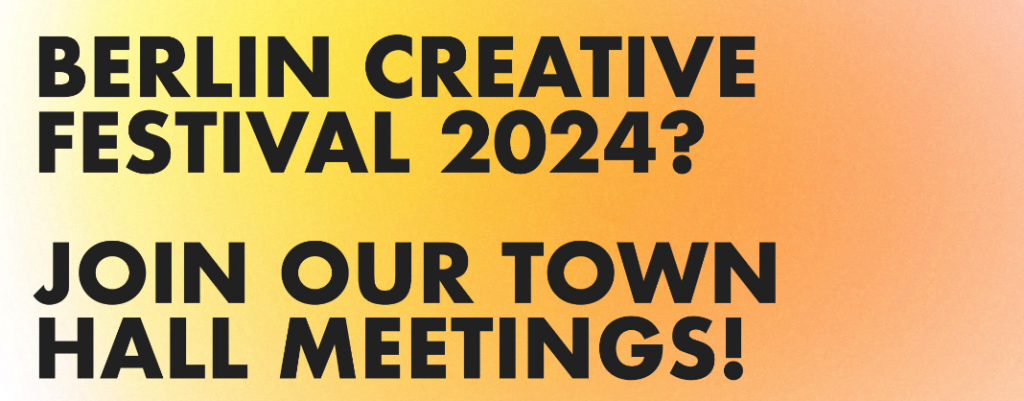
Last autumn, the Berlin Senate awarded multinational media news brands Axel Springer and Penske Media millions in funding for planning and implementing a multi-day culture & technology festival modelled on SXSW to take place in Berlin.
After heavy public criticism, the Berlin senate withdrew the funding, and plans for the festival have been postponed until 2024.
Berlin’s local creative scene is the heart and soul of the city’s artistic expression. The talent, passion, and unique perspective of the people that live and work there make Berlin a vibrant hub of creativity that captivates the world. Therefore, it is only fitting that they should be entrusted with designing a festival that celebrates the city’s creative spirit.
Transnational media companies may have the resources to organise events on a large scale. Still, they cannot capture the essence of Berlin’s local culture like the artists, designers, musicians, and creators who live and breathe it daily.
As an association of different actors in the cultural and technology scene, the Berlin Club commission has gathered all interested people and organisations to discuss the necessity of such a festival and develop frameworks for festival planning.
The Berlin Club commission invites Berliners to share and discuss their ideas with the other participants at two town hall meetings and attend keynote speeches by experts and thematic inputs on the current planning state. The findings will be documented and made publicly available afterwards:
Wednesday, March 22, 2023
Start at 8 pm, admission from 7:30 pm.
please note the location change to:
Betahaus Berlin,
Rudi-Dutsche Strasse 23
Tuesday, April 11, 2023
Start 7 pm, admission from 6:30 pm
Säälchen Holzmarkt 25
Holzmarktstraße 25, 10243 Berlin
In addition, ClubComission has written an open letter. They will send this “letter of interest for a planned creative festival” to the Berlin Senate Department for Economy, Energy and Enterprises.
Empowering the local creative scene to lead the festival’s design ensures that it reflects the city’s authentic voice and showcases the diversity of talent that makes Berlin’s creative scene unique. Furthermore, entrusting the festival’s design to the local creative scene has a positive impact beyond the event itself. It strengthens the community’s sense of ownership and pride in their city’s cultural heritage, fosters collaboration among different artistic disciplines, and provides opportunities for emerging talent to showcase their work on a larger stage.
For a festival that genuinely celebrates Berlin’s creativity, we must look to those who embody it daily: the local creative scene. Their vision, passion, and artistic excellence make Berlin a global cultural capital, and they should lead the way in designing a festival that reflects the city’s true spirit.
Sign now Spread the word! Share on social media!
MIXED UP: Cologne
MIXED UP is an ode to the unforeseen, co-creation, and encouraging raw creativity.
Helios 37 will be transformed into a dynamic canvas for an unforgettable night curated by Cologne-based collectives Schleuse Eins and e.p.i.q, alongside Absolut. The program will showcase groundbreaking interdisciplinary talent and local gems.
Please save the date for March 24th and join us for an evening of pioneering music, boundary-pushing performances and tantalising food and drinks.
Between 8 p.m. and 9.30 p.m., there are free drinks and 1x coupon for our food truck (while stocks last).
In 2013, The New York Times dubbed Nashville the “It City.”
Over the past 10 years, that moniker has become synonymous with Nashville’s explosive growth and the influx of new money and new people into the city.
Read more
Sex Drugs and Nightlife at SXSW
Monday March 13th · 10am-11am
Hilton Austin Downtown – Room 404
Join House of Yes and VibeLab as we connect with nightlife lovers and industry peers from around the world. Together we will explore the darkest (and brightest) parts of night culture while sharing new ideas for fostering healthy hedonism and safer spaces for audiences, artists, venues and everyone in between.
Further reading on our Nighttime Economy Summit panels
Last week, we had the opportunity to partner with the NTIA to organise the Night Time Economy Summit in London. The event was sold out, with 120 speakers and 1150 delegates. It’s always inspiring to connect with like-minded individuals and industry professionals IRL, and we couldn’t have been more thrilled to bring our global network to the table in London. We extend our gratitude to the Night Time Industries Association and the outstanding speakers who joined us.
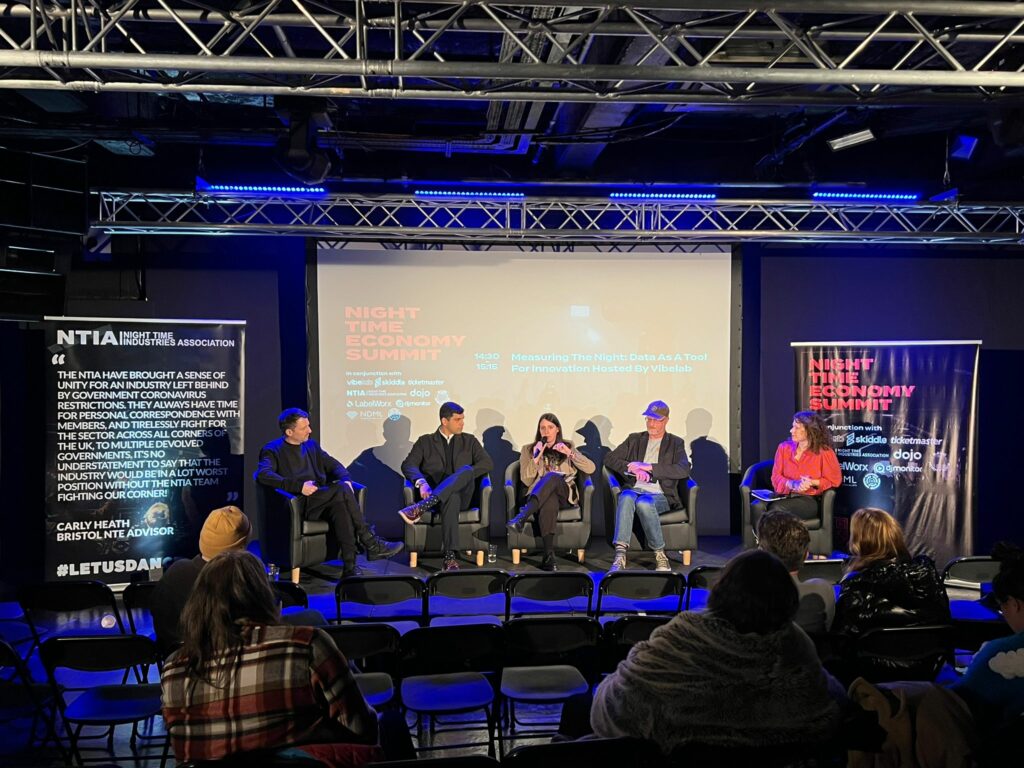
Our Creative Data panel highlighted the importance of collecting data on creative nighttime communities to build a resilient industry. Combining numerical and anthropological data can create a more comprehensive picture that includes facts and stories. This can lead to a more engaged response from policymakers, media, and stakeholders.
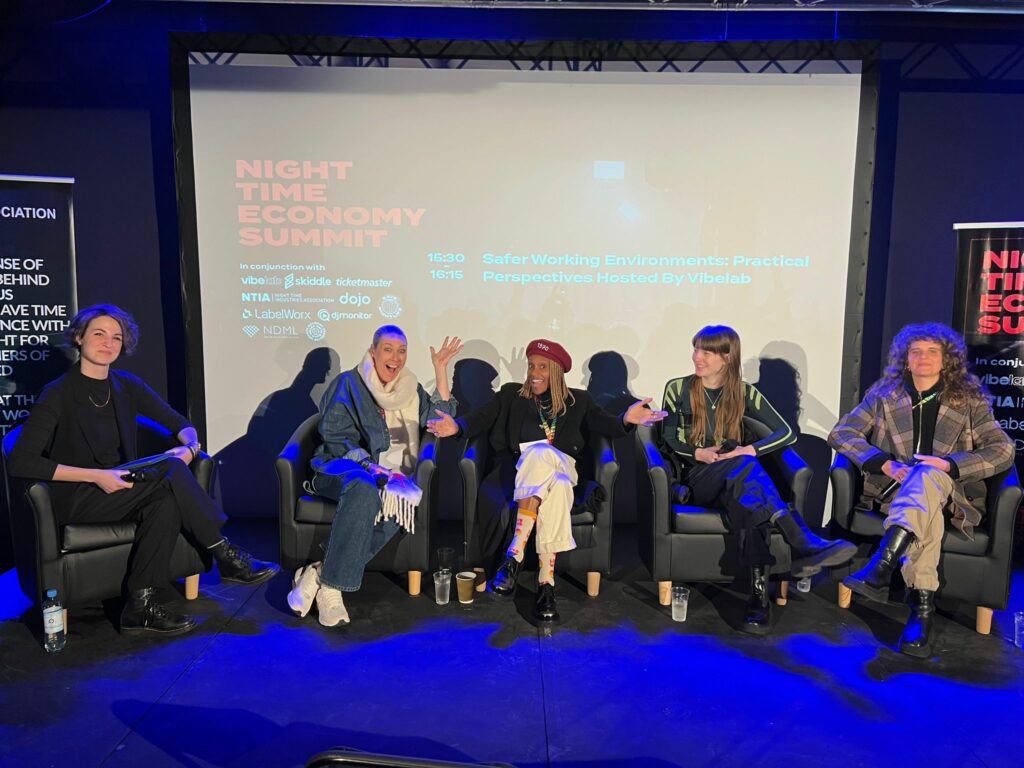
Next, our Safer Working Environments panel addressed how the idea of a safer space can be paradoxical. Still, the speakers at the Safer Working Environments Panel all agreed that safety in a community is not achieved through top-down rules but rather through a collective sense of security created by the community itself. Over-policing doesn’t work; collective action and education do.
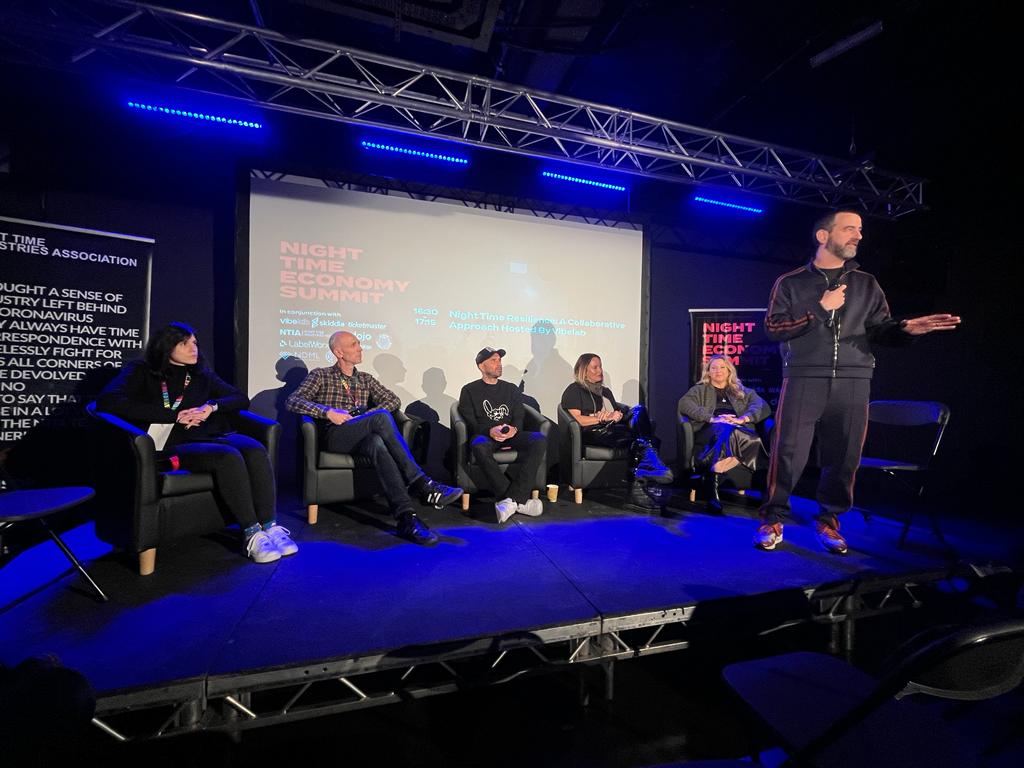
Lastly, our Nighttime Resilience panel examined how the night-time economy adapted and evolved during the pandemic. Building a strong and sustainable partnership within the nighttime community requires active listening, constant communication, and creating opportunities for growth and idea-sharing. Hospitality operators can play a crucial role in unifying the nightlife scene under one umbrella, and being a stable partner is vital as political parties change often. By supporting local scenes and taking risks with weekend programming, venues like Music Box Lisbon can prevent tourist gentrification while still attracting mainstream audiences during the week.
Further Reading/ Watching List:
Raising Their Voices: an independent report and review of sexual harassment within the Australian music industry has been published in full, collating the results of a survey contributed to by over 1,600 workers.
Rise-Up: The Nighttime Manifesto: A collective reflection of the values that drive global nighttime communities, calling for a large-scale acknowledgement and improvement for the night. Sign the manifesto now.
Club Commission Club Survey: The Berlin Club Survey, developed with the University of Bielefeld, Institute for Interdisciplinary Research on Conflict and Violence, yielded more than 4,370 valuable interviews. The publication on berlin Club Culture’s social significance will include a scientific evaluation of these results and scholarly papers.
Petition to save FUSE nightclub: So far, there have been 66,000 signatures after a noise complaint led to the closure of the 30-year-running institution. Brussels by Night Federation aims to utilise the agent of change model and to get clubs recognised as cultural institutions to prevent this from happening to other clubs,
True Music is a new Boiler Room global project to support pioneering artists & realise their creative visions through a series of original music collaborations.
British Council partnered with Boiler Room to organise the first Boiler Room in Pakistan, highlighting the local scene.
—–
The key takeaways from our panels are essential for driving positive change in the night-time economy.
We’re excited to continue our work and engage with more individuals and communities. We invite you to stay connected with us and check our events calendar to see where we’ll be this year.
Thank you for reading, and we look forward to connecting with you soon at SXSW or one of our upcoming events. Get in touch if you want to attend or arrange a meeting in Austin! jess@vibe-lab.org
News/Blog
Nashville Independent Venues Study (NIVS)
Content
News/Blog
- Nashville Metro Council Takes Action to Save Independent Music Venues

- Nashville Independent Venues Study to Host Open House for Community Input on Supporting Local Music Spaces
- In 2013, The New York Times dubbed Nashville the “It City.”

- Nashville Residents called for additional funding towards the “Metro Arts Commission”

- Nashville’s most important historic music venue is set for restoration on the National Historic Register


